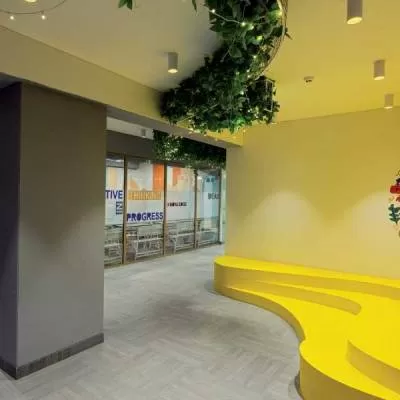- Home
- Real Estate
- We will approve Rs.600-800 crore of transactions every month.

We will approve Rs.600-800 crore of transactions every month.
The intent is simple: To create vertical targeting fund and funding opportunities within real estate providing exposure across the entire capital stack; i.e. private equity, structured or mezzanine equity, structured debt, senior secured debt and even construction finance.
With this, Piramal Fund Management was set up to combine the erstwhile private equity platform (IndiaREIT) with the erstwhile NBFC (Piramal Finance). This unique combination of a debt and equity practice has facilitated a deeper engagement with development partners. ¨We are able to service their entire capital requirement through the project lifecycle, from longer tenure or initial stage equity funding to more mature or shorter tenure debt funding,¨ says Khushru Jijina, Managing Director, Piramal Fund Management. He offers more insight into the company with CW PROPERTY TODAY.
Tell us about the recent Indiareit Apartment Fund.
Piramal Fund Management has launched a new fund targeting buying of individual residential units - Indiareit Apartment Fund seeks to acquire residential units in Tier-I markets at a significant discount to prevailing market price by offering a bulk purchase to the developers.
The target fund size is Rs 350 crore (+ a green-shoe option of a further Rs 350 crore) with an average deal tenure of two to three years per transaction. IIFL Wealth Management Ltd is the exclusive distributor for the first close. The fund is targeted to individuals who, beyond a primary home, look to invest directly into real-estate as an asset class. The fund will therefore underwrite units only, i.e. physical square feet rather than financial participation, while adhering to the basic tenets of a defined use of funds, appropriate security and monitoring as well as ensuring developer alignment and project completion - key risks that a retail buyer in the open market would want to address.
What advantages does it offer compared to a conventional deal involving equity or debt funding at the SPV level?
This all-encompassing strategy helps create an aligned position, a win-win for all stakeholders. For developers, it enables them to advance construction and delivery of initial sales, facilitates increased visibility of site progress and enables them, in certain instances, to participate in the upside beyond a certain price threshold. For investors, the fund enables them to access value deals in the market and participate in a ´secured´ position with the benefit of a highly attractive price point, diligence and structuring vis-a-vis an individual transaction.
It also enables ´quicker´ realisation of attractive returns with smaller incremental price movements compared to retail participation at open market prices.
How do you foresee funding opportunities in real estate?
We typically underwrite only residential real-estate development. The market is attractive owing to the large demand-supply imbalance for mid-priced housing. Given the self-liquidating nature of such developments (beyond the initial capital required to fund the land acquisition, sanctions and approvals, receipts from sales typically self-fund a large part of the construction cost) and the ability to ultimately monetise the completed units (there is always established end user demand for the right units), such investments are more appropriate given the fixed fund tenures of most of our vehicles.
We are able to earn an appropriate risk-adjusted return for the duration of our investment and typically most market participants underwrite residential funding to deliver upwards of a 24 per cent IRR on an annual basis for equity funding and upwards of 18 per cent for secured or debt funding.
Also, novel concepts such as the apartment fund we have launched or the focused redevelopment fund we closed two years ago are sure to find favour as they have been designed to address a dislocation that exists in the market and earn a relatively high risk-adjusted return.
We have typically not invested in standalone commercial developments although we have built commercial as a component of large townships as part of our vintage funds. Until recently, an exit route did not exist for such assets beyond strata selling individual units. Typically you build, identify tenants and enjoy a rental yield if you do not follow the sales approach and without an exit option (in the form of buyers for such completed units or the ability to list as a REIT). Last, we do not invest in both hospitality and retail as we believe these businesses require a long time to gestate. There are funds who focus on these asset classes but it requires a very different underwriting and more patient capital.
What are your unique lending options?
Today, the private equity industry has greatly consolidated with fewer market participants remaining. Only those funds that have managed to consistently raise funds, deploy them effectively and create exits have been able to grow. We think the opportunities are tremendous given that the entire cycle of realty funds is really in its infancy as compared to the West. With track records emerging and the market having matured, the next cycle of fund raising is already expected to deliver better risk-adjusted returns given that both fund managers and developers are more mature and rational and the markets have course-corrected with the excesses of the past giving way to a seasoned approach.
In the funding space, today the flavour is still very much of ´structured´ exposure across late stage financing or senior secured debt. Preferred equity is bound to return at some point but for the moment the market is still underwriting structured or mezzanine funding. We are also seeing takers for blended construction finance; i.e. for certain developers, we may initiate structured funding at higher rates but at a later stage when the loan is closer to maturity we may extend construction finance at a reduced rate as well, subject to our assessment of the nderwriting risks and significant milestones having been achieved. By doing this, the developer is able to stay with us and avoid the time-consuming process and associated costs of prepayment or refinance.
Developers are eyeing the Tier-II and Tier-III markets for expansion. What are your offerings for this market?
We have a strict investment focus that extends only to Tier-I cities namely Mumbai, NCR, Bengaluru, Pune and Chennai. Moreover, we believe real estate is an extremely local and nuanced business and as such follow an approach where we have local teams who are well versed in region-specific building processes and sanctions. Therefore, we are only comfortable investing in a city where we have an established track record and understanding of the market. Any new exposure would naturally need to be predicated by setting up a team. But some Tier-II cities do look interesting and we are currently evaluating the same, albeit on behalf of debt rather than equity funding.
Tell us about the support offered to important projects.
We do not typically comment on specific assets in our portfolio; suffice to say that we have successfully participated in the growth and ´institutionalisation´ of many of our development partners by virtue of going much beyond just providing capital. We take an active role in determining product, sales and pricing strategies and extend all kinds of support to our development partners. As testament to this, we have repeat investments with many development partners across our portfolio.
How will the issuance of Real Estate Investment Trust (REIT) ease funding options?
The REIT regulations present an interesting opportunity. Although the Budget was a step in the right direction, more clarity is required and expected (on account of the tax treatment of such vehicles and general availability of assets) to make the regulations competitive given the nuances of commercial development in the Indian context coupled with the returns that most investors have come to expect from REITs world over. It is, therefore, perhaps a little early to comment on the impact of REITs on easing funding although for those developers that own such assets, REITs will provide a natural exit option by means of listing and creating liquidity.
PE investment in the real-estate sector is likely to touch $2 billion in 2014...
We think the $2 billion figure is slightly understated. In fact, in the past four months since April, we alone have approved about Rs 2,000 crore of transactions on behalf of both the proprietary debt book and the funds business. We expect to maintain the same run rate in terms of transaction flow and will approve Rs 600-800 crore of transactions every month.
This is because of our unique position in the marketplace as a perpetual source of capital and our ability to underwrite transactions across the entire capital stack, ranging from early stage equity to late stage debt and construction funding and now even bulk purchase of apartments through our Apartment Fund.
QUICK Bytes
- Piramal Fund Management has launched a new fund (size: `350 crore) targeting buying of individual residential units.
- It has a strict investment focus that extends only to Tier-I cities.
- In the funding space, today the favour is ´structured´ exposure across late stage financing or senior secured debt.
- Khushru Jijina, Managing Director, Piramal Fund Management The intent is simple: To create vertical targeting fund and funding opportunities within real estate providing exposure across the entire capital stack; i.e. private equity, structured or mezzanine equity, structured debt, senior secured debt and even construction finance. With this, Piramal Fund Management was set up to combine the erstwhile private equity platform (IndiaREIT) with the erstwhile NBFC (Piramal Finance). This unique combination of a debt and equity practice has facilitated a deeper engagement with development partners. ¨We are able to service their entire capital requirement through the project lifecycle, from longer tenure or initial stage equity funding to more mature or shorter tenure debt funding,¨ says Khushru Jijina, Managing Director, Piramal Fund Management. He offers more insight into the company with CW PROPERTY TODAY. Tell us about the recent Indiareit Apartment Fund. Piramal Fund Management has launched a new fund targeting buying of individual residential units - Indiareit Apartment Fund seeks to acquire residential units in Tier-I markets at a significant discount to prevailing market price by offering a bulk purchase to the developers. The target fund size is Rs 350 crore (+ a green-shoe option of a further Rs 350 crore) with an average deal tenure of two to three years per transaction. IIFL Wealth Management Ltd is the exclusive distributor for the first close. The fund is targeted to individuals who, beyond a primary home, look to invest directly into real-estate as an asset class. The fund will therefore underwrite units only, i.e. physical square feet rather than financial participation, while adhering to the basic tenets of a defined use of funds, appropriate security and monitoring as well as ensuring developer alignment and project completion - key risks that a retail buyer in the open market would want to address. What advantages does it offer compared to a conventional deal involving equity or debt funding at the SPV level? This all-encompassing strategy helps create an aligned position, a win-win for all stakeholders. For developers, it enables them to advance construction and delivery of initial sales, facilitates increased visibility of site progress and enables them, in certain instances, to participate in the upside beyond a certain price threshold. For investors, the fund enables them to access value deals in the market and participate in a ´secured´ position with the benefit of a highly attractive price point, diligence and structuring vis-a-vis an individual transaction. It also enables ´quicker´ realisation of attractive returns with smaller incremental price movements compared to retail participation at open market prices. How do you foresee funding opportunities in real estate? We typically underwrite only residential real-estate development. The market is attractive owing to the large demand-supply imbalance for mid-priced housing. Given the self-liquidating nature of such developments (beyond the initial capital required to fund the land acquisition, sanctions and approvals, receipts from sales typically self-fund a large part of the construction cost) and the ability to ultimately monetise the completed units (there is always established end user demand for the right units), such investments are more appropriate given the fixed fund tenures of most of our vehicles. We are able to earn an appropriate risk-adjusted return for the duration of our investment and typically most market participants underwrite residential funding to deliver upwards of a 24 per cent IRR on an annual basis for equity funding and upwards of 18 per cent for secured or debt funding. Also, novel concepts such as the apartment fund we have launched or the focused redevelopment fund we closed two years ago are sure to find favour as they have been designed to address a dislocation that exists in the market and earn a relatively high risk-adjusted return. We have typically not invested in standalone commercial developments although we have built commercial as a component of large townships as part of our vintage funds. Until recently, an exit route did not exist for such assets beyond strata selling individual units. Typically you build, identify tenants and enjoy a rental yield if you do not follow the sales approach and without an exit option (in the form of buyers for such completed units or the ability to list as a REIT). Last, we do not invest in both hospitality and retail as we believe these businesses require a long time to gestate. There are funds who focus on these asset classes but it requires a very different underwriting and more patient capital. What are your unique lending options? Today, the private equity industry has greatly consolidated with fewer market participants remaining. Only those funds that have managed to consistently raise funds, deploy them effectively and create exits have been able to grow. We think the opportunities are tremendous given that the entire cycle of realty funds is really in its infancy as compared to the West. With track records emerging and the market having matured, the next cycle of fund raising is already expected to deliver better risk-adjusted returns given that both fund managers and developers are more mature and rational and the markets have course-corrected with the excesses of the past giving way to a seasoned approach. In the funding space, today the flavour is still very much of ´structured´ exposure across late stage financing or senior secured debt. Preferred equity is bound to return at some point but for the moment the market is still underwriting structured or mezzanine funding. We are also seeing takers for blended construction finance; i.e. for certain developers, we may initiate structured funding at higher rates but at a later stage when the loan is closer to maturity we may extend construction finance at a reduced rate as well, subject to our assessment of the nderwriting risks and significant milestones having been achieved. By doing this, the developer is able to stay with us and avoid the time-consuming process and associated costs of prepayment or refinance. Developers are eyeing the Tier-II and Tier-III markets for expansion. What are your offerings for this market? We have a strict investment focus that extends only to Tier-I cities namely Mumbai, NCR, Bengaluru, Pune and Chennai. Moreover, we believe real estate is an extremely local and nuanced business and as such follow an approach where we have local teams who are well versed in region-specific building processes and sanctions. Therefore, we are only comfortable investing in a city where we have an established track record and understanding of the market. Any new exposure would naturally need to be predicated by setting up a team. But some Tier-II cities do look interesting and we are currently evaluating the same, albeit on behalf of debt rather than equity funding. Tell us about the support offered to important projects. We do not typically comment on specific assets in our portfolio; suffice to say that we have successfully participated in the growth and ´institutionalisation´ of many of our development partners by virtue of going much beyond just providing capital. We take an active role in determining product, sales and pricing strategies and extend all kinds of support to our development partners. As testament to this, we have repeat investments with many development partners across our portfolio. How will the issuance of Real Estate Investment Trust (REIT) ease funding options? The REIT regulations present an interesting opportunity. Although the Budget was a step in the right direction, more clarity is required and expected (on account of the tax treatment of such vehicles and general availability of assets) to make the regulations competitive given the nuances of commercial development in the Indian context coupled with the returns that most investors have come to expect from REITs world over. It is, therefore, perhaps a little early to comment on the impact of REITs on easing funding although for those developers that own such assets, REITs will provide a natural exit option by means of listing and creating liquidity. PE investment in the real-estate sector is likely to touch $2 billion in 2014... We think the $2 billion figure is slightly understated. In fact, in the past four months since April, we alone have approved about Rs 2,000 crore of transactions on behalf of both the proprietary debt book and the funds business. We expect to maintain the same run rate in terms of transaction flow and will approve Rs 600-800 crore of transactions every month. This is because of our unique position in the marketplace as a perpetual source of capital and our ability to underwrite transactions across the entire capital stack, ranging from early stage equity to late stage debt and construction funding and now even bulk purchase of apartments through our Apartment Fund. QUICK Bytes Piramal Fund Management has launched a new fund (size: `350 crore) targeting buying of individual residential units. It has a strict investment focus that extends only to Tier-I cities. In the funding space, today the favour is ´structured´ exposure across late stage financing or senior secured debt.




















